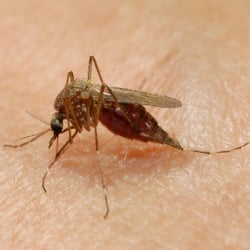
Insect repellants: the pros and cons
7 June 2012
Q: Our family is embarking on a camping trip for the first time and I am concerned about insect bites, especially for my youngest son who is only 4 years old. Is it safe to apply insect repellant on children, and if so, what kind is recommended?
A: Camping is a great activity to get the family outdoors and enjoy nature. However, we must share this space with other critters, including pesky mosquitoes, black flies and ticks. Insect repellant will go a long way in discouraging these insects from dining on your children. You can also take other precautions to reduce bug bites and make your getaway is a pleasurable one.
Insect repellants: the pros and cons
There are many insect repellants available –some contain synthetic chemicals and others that have natural ingredients. In general, those products that contain DEET (N, N-Diethyl-3-methylbenzamide) are considered the best defense against biting insects. However, this product is not recommended for use in children under two months. Even in older children, DEET-containing products should be used sparingly.
Use the following guidelines for application of DEET-containing products for the whole family:
- For children between six months and two years of age, use one application per day of an insect repellent containing 10 percent or less DEET in situations where benefits of putting the insect repellent outweigh risks.
- For children between two years and 12 years of age, up to three applications per day of a product containing 10 percent or less DEET can be used.
- Individuals 12 years of age and older can use DEET products of up to 30 percent DEET concentration.
An alternative product to DEET is picaridin (KBR 3023), which is widely used in Europe. It is a pleasant-smelling product without the oil residue associated with DEET and is available in concentrations of 5 to 10 percent. It is recommended to use 5 to 10 percent picaridin repellant on children that are over six months of age.
Repellants made from essential oils found in plants such as citronella, cedar, eucalyptus and soybean are generally much less effective than DEET-containing products and usually last less than two hours.
Chemical repellants with permethrin are used to kill ticks on contact. They should ONLY be applied to clothing and equipment and NOT directly to skin. These are very effective and last for several washings.
Other helpful precautions:
- Avoid areas where insects nest or congregate including garbage areas, pools of water, uncovered food and orchards;
- Dress your child in long pants and a lightweight long-sleeved shirt, especially at dawn and dusk;
- Avoid dressing your child in bright colors or flowery prints;
- Avoid using scented soaps or perfumes.
- Use sunscreen/repellant combinations: sunscreen needs to be applied more frequently than repellant.
Do:
- Watch for reddened areas, where your child has scratched. These areas may become infected and need further care.
